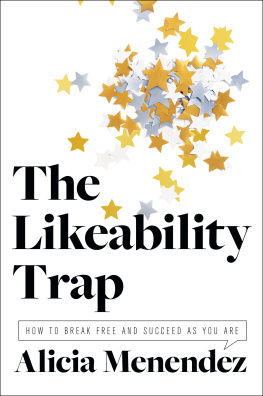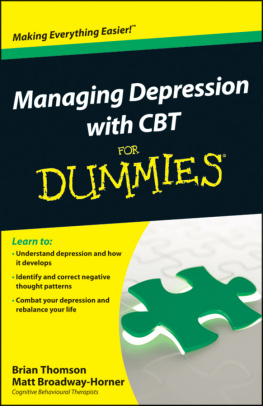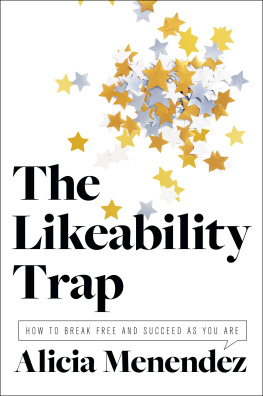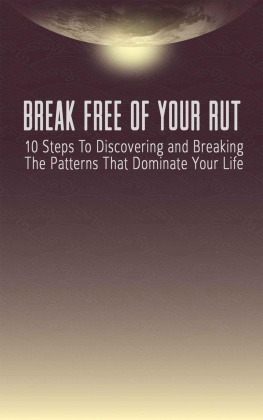Contents
For Jane, who is always herself
To be nobody-but-yourselfin a world which is doing its best, night and day, to make you everybody elsemeans to fight the hardest battle which any human being can fight; and never stop fighting.
e. e. cummings
Chapter 1
Please Like Me
I have to admit something to you, something I hate to admit: it is very important to me that you like me. This has always been the case, and it has taken many forms, including, but not limited to: gratuitous smiling, rapid response time, holding my tongue, changing the way I look, pretending not to care (but still caring), and judging myself for caring, to name a few.
I had always assumed that the degree to which I cared was unique to me. In 2015, I learned that I was wrong.
That year I traveled to Albuquerque, New Mexico, to give a speech in front of six hundred professional women at a conference hosted by the American Business Womens Association. While on one hand I am all business, in reality I know little about actual business, so I instead used the speech as a personal therapy session. At the time, I was anchoring a television show on a third-tier cable network. I was struggling with constant and competing feedback about who I should be, everything from how I styled my hair (her forehead is too big for a center part) to how I, an old soul, communicated my youth (more T-shirts) to how I navigated the internal politics of an office that was part media company, part start-up, part grand experiment (lots of crying in bathroom stalls). With all of this incoming, unsolicited, and often contradictory commentary, I was slowly coming to terms with the fact that I might not be able to make everyone happy, and that in order to do what was necessary to ensure my and my teams success, I might need to ruffle some feathers.
Around the same time, Chimamanda Ngozi Adichie, the writer and MacArthur Grant genius whose TED Talk was used on the track for Beyoncs song Flawless, told an audience that likeability is bullshit. Adichies proclamation set the internet ablaze and made me wonder if the fact that I largely valued my own worth by my likeability meant that I myself was bullshit. Was my caringas a Cancer, a cryer, an INFJ (Introvert, Intuitive, Feeling, Judging)holding me back? I wanted to be myself, do good work, lead my team, and feel, well, liked. Why did that seem so hard?
In my gut, I knew I wasnt alone in caring, even if I cared more than most. Some light internet research confirmed that women face a likeability penalty in everything from hiring to promotions. I knew that women running for office have to prove that they are likeable and competent. Plus, as women, were taught to care about what others think of us. I couldnt possibly be the only one who made it to adulthood without shaking that mandate, could I?
On that stage in Albuquerque, I looked out at the crowd of women, grabbed the sides of the podium with sweaty palms, and hoped for the best. I shared with the audience my own desire to be well liked, and the many times that ran into conflict with my efforts to lead. I explored the contradictory messages of the importance of likeability and the importance of authenticity. I then suggested that perhaps attendees use this conference to try caring less on for size. Who would they be if they took a few days to just be themselves?
When I finished giving my speech, the crowd didnt cheer; they roared. When the host of the event opened the floor up for questions, women streamed to two microphone stands at the front of the room. Most of them didnt have questions; they had testimonials.
Their peers saw them as nice ladies, but not leadership material. They spoke in every meeting and advocated on behalf of their teams, and then got reviews suggesting that they round off their edges. They wanted to get ahead, but they wanted to get ahead as themselves.
I had struck a nerve.
At the end of these statements, their voices inflected upward, and their hands flew into the air, intimating a question. Those queries were, in essence, always the same: If likeability matters, but I cant be both likeable and successful, then where does that leave me? If I need to act one way to be seen as a leader, but acting that way makes me less likeable and that performance makes me less authentic, then is it really working? And how do I learn to care less when I keep being told that I should care more?
I wasnt alone in feeling what I was feeling. I had uncovered an unspoken frustration. Now I needed to figure out what to do about it.
First, I needed to be sure that these six hundred women from across the country werent outliers or fakers who were just trying to make me feel better about being a thirty-something who couldnt seem to get a grip. I started by asking my friends, and their friends, if it was important to them to be well liked. I found that many of them felt the same way I did; they care deeply about being liked by friends, by colleagues, and by supervisors. This is the story of my life! multiple women exclaimed. Many women were ashamed of how much they cared, deeming it superficial or pathetic. Others wore it as a badge of honor; they celebrated their likeability as an ability to tap into others feelings and needs.
Many of the women who admitted to caring about likeability were surprised to learn that there are people in the world for whom being well liked isnt a priority, or women who dont spend their days attempting to please others. Sometimes they were envious of those non-carers; sometimes they were judgmental. One woman described people who dont care about being liked as probably on the scale of psychotic.
But it turns out, those women do exist! Women who are genuinely unfazed by what others think of them, women who looked at me blankly when I described my personal obsession. My own mother was puzzled by how much I cared whether or not others liked me. I assume everyone likes me, she said self-confidently. And if they dont? Well, screw them.
Their explanations for why they didnt care or couldnt care varied. Some women credited their parents for cultivating a sense of self that seemed impenetrable by others; others had taught themselves to care less. The work should speak for itself, was one rationale. Its more important to me to be respected than to be well liked was a common refrain, especially from more seasoned professionals. Some, particularly women of color, deemed likeability a luxury they could not afford or were disinterested in.
As someone who was motivated by likeability, I imagined women who dont care about likeability to all be living their best lives, being their authentic selves at work and at home. Marching to the beat of their own drummer! Dancing like no one was watching! Cutting loose those friends who were inconsiderate or judgmental, challenging those bosses who demanded conformity. But it turns out that even those who have a very clear and fixed internal compass independent of others perceptions acknowledged that they had, at points, paid a price for being so brazenly themselves. Many of them conceded that they had been penalized for not playing office politics or for not pretending to be perpetually pleasant. Some even admitted that it had limited their career advancement. One woman offered me this important distinction: although she is not motivated by likeability, it doesnt hurt any less when someone expresses their distaste for her.
Speaking with these women, thinking critically about my own professional journey, and reading the existing research on women and likeability, I realized that whether you care or you dont care what others think of you, there are still traps all around that will be an obstacle to getting ahead.










